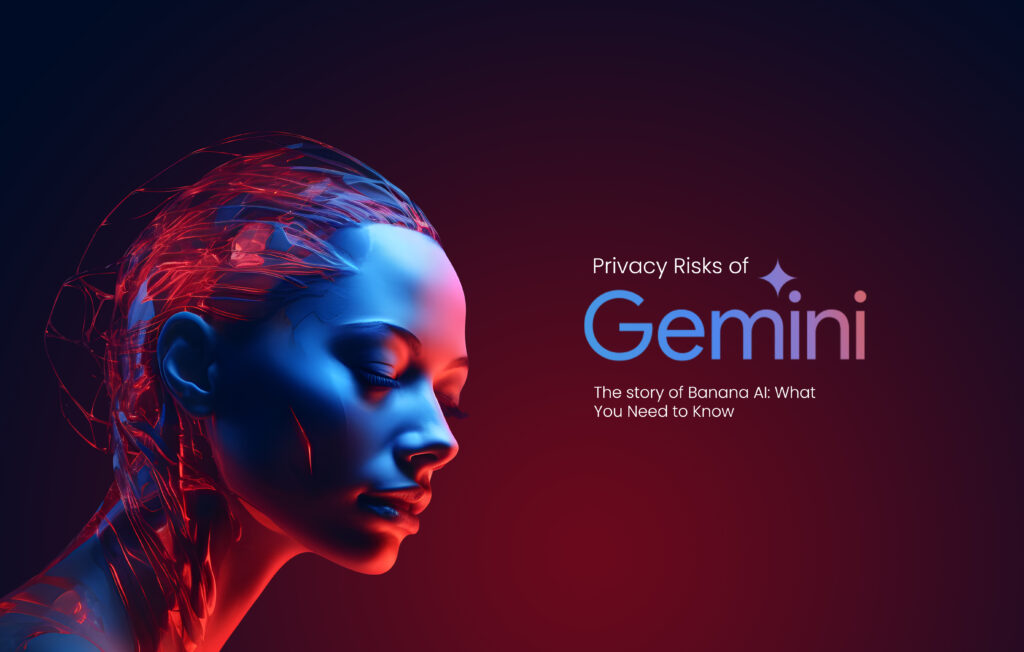
The Google Gemini Nano Banana AI trend is taking over Instagram and Google searches in 2025. From transforming selfies into retro Bollywood looks to festive saree edits, millions of users are experimenting with this viral tool. But beneath the fun lies a serious concern — Google Gemini Nano Banana AI privacy risks. Like many AI-powered image apps, it processes and stores personal photos, raising fears of data leaks, misuse, and even identity theft.
At Corindians, we focus on sharing the latest tech insights that help our community stay safe online. In this guide, we’ll uncover the privacy risks of Google Gemini Nano Banana AI, and share tips to protect your personal data.
What Is Google Gemini Nano Banana AI?
Google Gemini’s Nano Banana is a viral AI-powered image-editing feature. Users upload photos and apply AI prompts to create stylized portraits — like festive saree looks, retro Bollywood themes, or futuristic avatars.
Its popularity skyrocketed because:
- It integrates easily with the Google Gemini ecosystem.
- Social media trends amplify user-generated prompts.
- Festival-ready AI edits appeal to cultural moments in India.
Still, as we discussed in our blog on Top Digital Safety Tips in 2025, every viral AI trend comes with hidden risks.
Privacy Risks of Google Gemini Nano Banana AI
1. Data Collection and Storage
When you upload an image, AI systems may store it on cloud servers. According to Google’s AI Privacy Policy, some data may be retained for model training — creating uncertainty about where your photo ends up.
2. Unintended Sharing of Personal Information
Even casual selfies can reveal sensitive details like background, location, or personal identifiers. Once processed by AI, these details could potentially be at risk.
3. AI Misuse for Deepfakes
Edited photos could be exploited to create deepfakes. As highlighted in our post on Emerging AI Trends, deepfake misuse is one of the fastest-growing online threats.
4. Limited Control Over Content Deletion
Many users don’t realize that deleting an image from their device doesn’t guarantee removal from the AI system’s servers. This limited control raises red flags for digital rights.
5. Phishing & Fake Apps
Scammers are releasing fake “Nano Banana” apps on app stores. According to a Times of India report, some of these apps harvest personal data for phishing scams.
How to Stay Safe While Using Nano Banana AI
1. Use Only Official Apps
Stick to Google Gemini’s official app (Google Gemini Privacy Policy) and avoid third-party versions.
2.Read Privacy Policies
Always check how your data is stored. See our guide on privacy-friendly apps.
3.Avoid Uploading Sensitive Photos
Don’t use family pictures or confidential selfies.
4.Enable Two-Factor Authentication (2FA)
Protect your linked Google account from unauthorized access.
5.Regularly Clear Uploaded Data
If Gemini offers a deletion option, use it.
AI-powered apps like Nano Banana are reshaping how we interact with digital content. But with great creativity comes responsibility. As mentioned in our cybersecurity essentials guide, safeguarding personal data is not optional — it’s crucial
The Google Gemini Nano Banana AI trend is fun, creative, and Instagram-friendly. But its privacy risks are real. Before using the tool, think about where your images go, how long they’re stored, and how they might be reused.
Stay safe. Stay smart. Enjoy AI responsibly.
At Corindians, we’ll continue to share resources on AI safety, digital security, and real estate tech trends in India. For more insights, check out our latest tech blogs.
